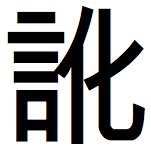
Just a quick cool kanji for today. Can you figure it out what it means based on the radicals alone? Check after the break to see if you are right. Continue reading


Just a quick cool kanji for today. Can you figure it out what it means based on the radicals alone? Check after the break to see if you are right. Continue reading
In which I play advice columnist to a reader. Elinor asked me about a Japanese guy’s response when she asked him out. See my response in the comments on one of my favorite old posts about かもしれない.
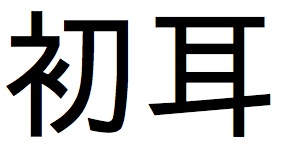
Short and simple today. 初耳 (はつみみ) is a nice quick way to say that you’ve heard something for the first time. Makes sense, right?
This:
それは初耳だ。
is 40% more efficient than this:
それを聞いたのは初めてだ。
And 初めて聞いた (the pattern I always used that now makes me think of an Eastern-European-accented “First time I hear this!”) I think should really only be used as a modifier, i.e. 初めて聞いたとき.
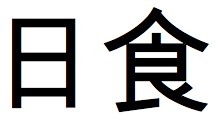
A pretty obvious post for today – the kanji for solar eclipse. It’s pronounced にっしょく, and I guess literally means “eat/swallow the sun.” Pretty cool stuff.
I found this link on how to enjoy the eclipse in Japan via a friend’s shared sites on Google reader. Remember, don’t look straight at the sun or you’ll end up like Radioactive Man. Looking straight at rain clouds, on the other hand, will do nothing to you but may ruin the day of small children with giant expectations.
Well, at least not always:
クリーム = 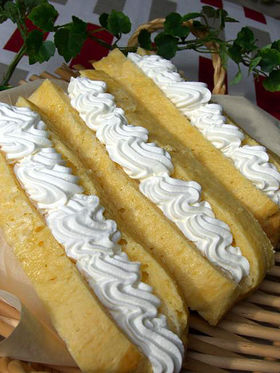
cream = 
The Japanese クリーム often refers specifically to the whipped variety that goes on top of cakes or inside tasty treats, most notably the シュークリーム. I often see this romanized on packages as “chou cream” for whatever reason. For those of you who can’t read Japanese, it actually sounds like “shoe cream,” which is a funny thought.
The Japanese and English Wikipedia entries are subtly different. In English, whipped cream is only listed below under “Other cream products,” whereas in Japanese whipped cream gets its own section and the photo at the top of the entry is a photo of a bowl of whipped cream.
I rest my case.
One of the recent themes of this blog has been alternate versions of basic phrases. In the past I’ve given nuanced versions, but today it’s just a straight up replacement. 久し振り (ひさしぶり, most often as 久しぶり) is the phrase that everyone knows, and it can quickly be replaced with しばらく, which literally means “a little while.” A couple of notes:
– Thinking about しばらく made me realize that leaving the です off of 久しぶり probably sounds really weird and unnatural to Japanese people. For whatever reason, 久しぶり feels like it can stand on it’s own (possibly because of that adjective-like り・い sound on the end?), whereas しばらく, to me, does not. Nice reminder not to drop your copulas.
– I think this is an old people phrase. Useful if you like to add to your 渋い aura.
– しばらく is also often used as an adverb. “Do something for a little while.” しばらく何かをする。しばらく休みましょう being a nice one. 久しぶり can also do this, but needs a にon its end. I believe both of them can act as adjectives with the assistance of の.
Update: – Matt’s comment made it clear to me that there is a slight difference between the adverbs. When used alone in the “long time no see” sense, 久しぶり implies a positive verb (久しぶりに会う。) whereas しばらく implies a negative verb (しばらく会っていない。). Very cool.
線香花火 (せんこうはなび, literally “incense fireworks”) is a type of Japanese fireworks that usually gets translated into English as “Japanese sparklers.” They are slightly different from the usual American variety of sparklers in that you hold them facing down toward the ground rather than up toward the sky. Once lit, a small ball of what can only be described as “magical molten fire stuff” creeps up the thin thread of the sparkler, sending out random flashes of fractal-like sparkles. They are incredibly hypnotic to watch. (See photo at the Japanese Wikipedia site or in this video with music from Amano Shigeru.)
Once the ball gets to a certain point, it fizzles out quickly, which gives it the idiomatic meaning “flash in the pan” or “to fizzle out quickly.” You often see 線香花火のよう(に・な) and sometimes 線香花火的.
Belated Happy 4th of July!
Update: Commenter robert found this great video showing exactly how they sparkle. Looks like there are more videos searching under “senkou hanabi” than “線香花火”.
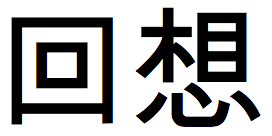
回想 (かいそう) literally means “spin thoughts around,” or something like that. 想い (おもい) is, I believe, the direct object of 回す (まわす). Why are they not in the Japanese order (DOをVする)? I think it’s because the compound is Chinese in origin and therefore uses the same grammatical order as English (Subject Verb Object).
A less literal translation gives you “recall, recollect.” The other possibility is “flashback,” which is how I saw it used the other day. Pretty cool stuff.
Anyone who’s looking for a good dictionary should check out Amazon Japan. There are super cheap copies of old editions of Kenkyusha’s New Japanese-English Dictionary, aka the Green Goddess. It’s famous for loads of usage examples. The old edition is also good for beginners since entries are listed in alphabetical order. It’s a steal at 786 yen.
I would be remiss if I didn’t provide this link (via Wikipedia) to Tom Gally’s writings. He worked on the fifth edition of the dictionary. You can read specifically about the dictionary here, here, here and here.